The Somerset Newsflash, May 2022
Important Dates
- June 4, 2022: Maine Beef Producers Meet & Greet & Brisket BBQ
- June 10, 2022: Deadline to submit Maine 4-H Fryeburg Fair Market Lamb intent form
- June 30, 2022: Deadline to submit all other 4-H commodity intent forms
- July 24, 2022: Open Farm Day
- October 9, 2022: Maine Fiber Tour and Trail
Contents
The News
Somerset County Extension Seeking to Hire Agriculture and Food Systems Professional
We are hiring!
The Agriculture and Food Systems Professional with the University of Maine Cooperative Extension is a full-time, fiscal-year, continuing contract eligible faculty appointment. This position is responsible for implementing educational programs in support of the over 500 commercial farms in the county, including a vibrant maple production industry. This work will often be done in partnership with county-based colleagues and statewide commodity (potato, dairy, vegetable) or subject specialists (water quality, pest management, food safety) within Cooperative Extension. The professional will also respond to the needs of home gardeners and have overall responsibility for the county Master Gardener Volunteer program.
Please help us spread the word about this opportunity! If you know someone who may be interested in this position, please refer them to the position description on the UMaine job site.
UMaine Extension Hosts Interactive Plant Sales Map
May and early June mark the planting season in Maine gardens, and the University of Maine Cooperative Extension Master Gardener Volunteers program is again hosting an interactive plant sales map.
The 2022 Spring Plant Sale Fundraisers in Maine map listings are alphabetical by date. Find more information about the map and how to add a group’s sale to it on the map webpage.
Another timely resource is the UMaine Extension publication “Best Practices for Plant Sale Donors and Buyers in Maine,” available for free download. Being an informed plant sale donor or buyer helps raise funds for organizations, and it means getting the right plant for the right spot in a garden and avoiding future problems.
More information is available on the UMaine Extension Garden and Yard website, or by contacting 207.581.8211 or lynne.holland@maine.edu.
Facts on Maine Foods for May: Fiddleheads, Rhubarb, and More
University of Maine Cooperative Extension offers information and workshops to help consumers find, grow, use, preserve, and store in-season fruits and vegetables in Maine. Seasonal favorites for May include:
- Facts on Fiddleheads
- Facts on Edible Wild Greens in Maine
- Fruits for Health: Rhubarb
- Spring Refrigerator Pickles
UMaine Extension educator Kathy Savoie demonstrates new techniques for cooking, freezing, and pickling fiddleheads in an easy-to-follow video. Fiddleheads in particular require exact cooking methods — boiling for at least 15 minutes or steaming for 10–12 minutes to reduce the risk for foodborne illness associated with raw and undercooked fiddleheads.
Get ready for the arrival of Maine’s seasonal foods by attending an upcoming food preservation workshop or sign up for the Spoonful Blog to receive bite-sized food and nutrition information.
Bulletins are available for download or to order on the Extension publications website. More information also is available by contacting 207.581.3188, 800.287.0274 (in Maine); extension@maine.edu.
Helpful Gardening Resources
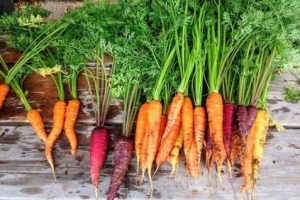 We want to remind you that Cooperative Extension offers all kinds of helpful resources for Maine gardeners. If you have a garden, you may want to check out some of these:
We want to remind you that Cooperative Extension offers all kinds of helpful resources for Maine gardeners. If you have a garden, you may want to check out some of these:
- On Demand Webinars: Bundles of three to four prerecorded webinars about starting and maintaining a home orchard, gardening with native plants, composting and soil health, and seed selection and starting. The webinars allow viewers to watch and learn at their own pace and include lists of recommended resources. The webinar bundles are offered on a sliding scale fee of $0–$30. More information about how to purchase the bundles is available on the gardening webpage. For more information or to request a reasonable accommodation, contact Rebecca Long, 207.743.6329; extension.gardening@maine.edu.
- Growing Maine Gardeners: An initiative led by UMaine Extension’s Home Horticulture team to address the increased demand for gardening education throughout the state of Maine and to provide additional support for beginner gardeners.
- Garden Mentorship Program: direct technical assistance and encouragement via phone or email throughout the season from trained Master Gardener Volunteers.
- Maine Farm Products and Pick-Up Directory: The directory provides information on available local farm products and alternative pick-up options developed by farmers statewide to accommodate the recommended social distancing in light of COVID-19.
- Identifying insect pests: Charley Armstrong, will identify pest samples via images. See instructions for submitting an insect specimen.
- Identifying plant diseases: Dr. Alicyn Smart will identify plant disease samples via images. See instructions for submitting a sample.
- Tick testing: Ticks are being tested on a limited basis. See instructions for submitting a tick sample.
- Publication orders: We are still processing orders from our publication catalog, including pesticide application training materials.
- Soil testing: The Analytical Lab and Maine Soil Testing Service remains open and is taking samples with a priority on commercial samples. If you need to drop off a sample, you can place it in the box outside of Deering Hall; do NOT enter the building.
- General gardening questions: Contact your county office. Emails are preferred. If it’s necessary to leave a voicemail, please leave your email address (if available) or a mailing address in addition to your phone number.
- Maine Home Garden News: Consider subscribing to this helpful and inspiring monthly newsletter.
Greenhouse Plastic Recycling Program
University of Maine Cooperative Extension opened its Greenhouse Plastic Recycling (GPR) program April 19 with drop-off sites available statewide through November 21.
Plastic eligible for recycling is clear, low-density polyethylene #4 (LDPE #4) used to cover greenhouses, high tunnels, hoop houses and other agricultural structures. The program will also accept white overwintering plastic bundled separately from clear plastic. UMaine Extension’s GPR program video explains the process in full.
This will be the third year for the recycling program, begun in 2020 with a one-year Maine Department of Environmental Protection Waste Diversion grant. The program’s goal is to collect at least one-third of Maine’s annual waste greenhouse plastic, diverting that waste for use in new plastic products. To date, the program has collected almost 2,600 pounds of this plastic waste.
There is no program fee; registration is required. Register and find more information on the GPR program website. More information also is available by contacting Matt Wallhead, 207.581.2949; agplasticrecycling@maine.edu.
May is Lyme Disease Awareness Month in Maine
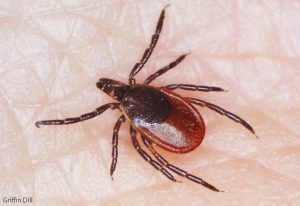
With warmer weather on its way, Lyme Disease Awareness Month is here again! Health care providers reported 1,508 cases of Lyme disease in 2021 (as of March 25, 2022). The 2022 Lyme Disease Awareness Month theme this May is “Tick Wise.” This reminds us to stop and practice tick prevention measures frequently. The easiest way to avoid tick-borne diseases is preventing tick bites. Please remember to be “Tick Wise” and:
- Know tick habitat and use caution in areas where ticks may live.
- Wear light-colored clothing that covers arms and legs.
- Use an EPA-approved repellent such as: DEET, picaridin, IR3535, or oil of lemon
eucalyptus. - Perform tick checks on yourself, family members, and pets daily and after any outdoor
activity. Take a shower after exposure to a tick habitat to wash off any crawling ticks.
Infected deer ticks can spread the bacterium that causes Lyme disease when they bite. For transmission to occur, the deer tick must be attached for 24-48 hours. Use frequent tick checks to find and remove ticks as early as possible.
In Maine, adults over the age of 65 years and children between the ages of 5 and 15 years are at
highest risk of Lyme disease. People that work or play outside are also at high risk of encountering
infected ticks.
If a tick bites you or you spend a lot of time outdoors, make sure to watch for symptoms for up to 30 days after exposure. Also be sure to call a health care provider if symptoms develop. The most common symptom of Lyme disease is a skin rash. This is better known as the “bull’s-eye” rash. The rash usually appears 3-30 days after the tick bite and can show up at the bite site or anywhere else on the body. Other symptoms include fever, headache, and joint or muscle pain. Lyme disease is treatable, and most people recover fully.
Lyme disease is not the only disease that deer ticks in Maine can carry. Anaplasmosis, babesiosis, Borrelia miyamotoi disease, and Powassan virus disease are other tickborne infections found in
Maine, which saw record cases of anaplasmosis and babesiosis in 2021 and tied the record number of Powassan virus disease infections statewide.
The deer tick is the only species of tick in Maine that can pass the bacterium that causes Lyme
disease. Still, there are several other species of ticks found across the state. Tick identification is
important, especially when removing ticks. Free tick identification resources can be ordered at the
Maine CDC website. University of Maine Cooperative Extension Tick ID Lab also offers tick
identification and testing services.
Resources:
- Lyme disease information available at www.maine.gov/lyme
- Lyme disease data available through the Maine Tracking Network at www.maine.gov/lyme under “Maine Tracking Network: Tickborne Diseases” on the left-hand side of the page
- University of Maine Cooperative Extension Tick ID Lab submission instructions found at www.ticks.umaine.edu
- For additional questions, please call Maine CDC at 1-800-821-5821 or email disease.reporting@maine.gov
- Tickborne disease videos found at http://www.maine.gov/idepi under “Videos” on the left-hand side of the page
- Tick identification resources and other materials available to order at www.maine.gov/dhhs/order
- To continue getting Lyme updates throughout May, follow Maine CDC on Facebook, Instagram, and Twitter
The News in Agriculture
Maine Beef Producers Meet & Greet & Brisket BBQ
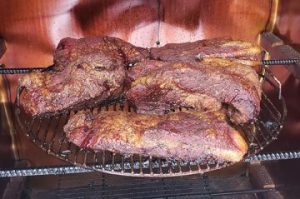 Join the Maine Beef Producers Association and the University of Maine Cooperative Extension for a Brisket BBQ and meet and greet with fellow beef producers, UMaine Extension, and service providers like USDA Rural Development, NRCS, and FSA to ask informal questions and learn what services are available. Anyone interested in beef production, new or experienced farmers, and anyone wanting to interact with current beef producers is invited to attend.
Join the Maine Beef Producers Association and the University of Maine Cooperative Extension for a Brisket BBQ and meet and greet with fellow beef producers, UMaine Extension, and service providers like USDA Rural Development, NRCS, and FSA to ask informal questions and learn what services are available. Anyone interested in beef production, new or experienced farmers, and anyone wanting to interact with current beef producers is invited to attend.
June 4, 2022, 10:45 – 2:00 PM
Knight Family Farm
30 Jones Road in Garland, Maine
Cost: $10
Schedule:
- 10:45-11:00 a.m. — Registration
- 11:00 a.m.-Noon —Introductions from guests and how they interact with beef producers
- Noon-1:00 p.m. — Lunch
- 1:00-2:00 p.m. — Tour of Knight Family Farms, discussions on how to integrate swine production onto your farm to diversify and reach new customers
Visit the Meet & Greet Program Page for more information and to register. If you are a person with a disability and need an accommodation to participate in this program, please call Melissa Babcock at 207.581.2788 or 1.800.287.7170 (in Maine) to discuss your needs. Receiving requests from accommodations at least 10 days before the program provides a reasonable amount of time to meet the request, however, all requests will be considered.
Sign Up for the Maine Fiber Tour and Trail
Now is the time! This annual agritourism promotion happens in October (October 9 this year). There is no fee to join promotions, but you must sign up via Real Maine.
This event helps visitors explore Maine’s fibershed. They may be farms (e.g., fiber animals and plants), and/or processors (e.g., mills, weavers, dyers), and/or sell fiber products such as clothing, art, and other non-synthetic textiles (e.g., farms, specialty retail sites).
If you are a Maine farm or fiber processor who would like to participate (or know of a farm who would like to participate), please email Real Maine.
Sign Up for Open Farm Day
Now is the time! Maine’s annual Open Farm Day happens the fourth Sunday in July (July 24 this year). There is no fee to join promotions, but you must opt in via Real Maine.
The sign up steps differ for those with who currently have a listing, and those who don’t. Please, start here:
- Not sure if you have a listing? Take a look – search for your farm on RealMaine.Com
- For those who already have a member listing
- For those who do not have an account or member listing
Maine Ranked 5th in Direct Market Sales!
In 2020, farmers produced and sold $9 billion of local edible food commodities directly to consumers, retailers, institutions, and intermediaries. Direct farm sales of food increased by 3% from 2015. The number of operations selling locally produced food decreased by 12%. Intermediaries and institutions accounted for 46% of direct food sales while direct-to-consumer sales accounted for 33%. Direct farms sales included both fresh foods and processed or value-added products such as bottled milk, cheese, meat, wine, and jams.
Top States in Direct Farm Sales ($ million)
- California 1,432
- Pennsylvania 600
- New York 584
- Michigan 555
- Maine 342
Money for PFAS Testing
The PFAS Testing Grants Program is available to all commercial farms throughout the state. The program is administered by MFT and MOFGA to assist farmers who have concerns regarding potential PFAS contamination.
The Program will pay for:
- Testing of home or irrigation water for contamination with these chemicals.
- Testing of products or inputs if a farm has any concerns relating to the purchase of inputs (hay, milk, etc.) from a farm known to have contamination.
- A simple application form will assess eligibility for the program and several farms will be selected upon a weekly review to participate in the program.
Get full eligibility requirements and program details at this PFAS Emergency Relief Fund webpage.
PFAS Farmer Wellness Fund
The PFAS Farmer Wellness Fund is intended to holistically support farmers and farm workers impacted by PFAS contamination and is being jointly administered by Maine Organic Farmers and Gardeners Association (MOFGA), Maine Farmland Trust (MFT), and the University of Maine Cooperative Extension (UMCE) and is funded by the Farmer and Rancher Stress Assistance Network.
As farmers wellness is broadly defined, there is a wide range of eligible uses for this fund including therapy, childcare, acupuncture, gift cards to purchase uncontaminated food and/or water, massage, traditional healers, and other supports that would help reduce stress at this time.
Eligibility:
- All commercial farms. A farm does not need to have confirmed high PFAS test results though those farms and farm workers will be prioritized
- Farm workers based on a farm affected by PFAS
- Indigenous food and medicine growers providing for community
We cannot pay the applicant directly for or reimburse any expenses, and will instead directly pay for any services or products you have requested. Please take care to verify the contact information for payment for the service or product before submission.
Highly Pathogenic Avian Influenza Update
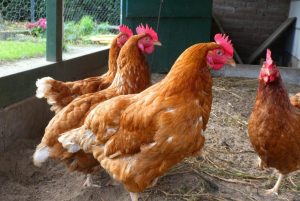 Dr. Anne Lichtenwalner, Extension Veterinarian and Director of the UMaine Veterinary Diagnostic Lab recently completed an update to Bulletin #2109 Avian Influenza and Backyard Poultry.
Dr. Anne Lichtenwalner, Extension Veterinarian and Director of the UMaine Veterinary Diagnostic Lab recently completed an update to Bulletin #2109 Avian Influenza and Backyard Poultry.- AI is something to keep in mind, should you notice respiratory disease in birds, but it’s not the only cause of respiratory symptoms or diarrhea in birds. There are several forms of influenza (AI) that can affect poultry: relatively non-pathogenic (low path AI; LPAI) and the more dangerous form (high path AI; HPAI). If you see severe illness and sudden death losses in your flock, you should call the regional USDA hotline: 866.536.7593, and also let your farm vet know. If your flock is experiencing losses, but you doubt that they are due to HPAI, then you should have a necropsy conducted; the University of Maine Veterinary Diagnostic Laboratory can assist farmers in our region. As well, now is a great time to review your poultry management to ensure the safety of your birds; we call this biosecurity.
- USDA’s National Veterinary Services Laboratories confirmed the presence of highly pathogenic avian influenza (HPAI) in samples taken from nine small flocks of non-commercial backyard birds (non-poultry). APHIS website.
- Maine Department of Agriculture, Conservation and Forestry (DACF) placed the properties under quarantine, and humane depopulation efforts have been completed.
- DACF has implemented additional safety measures, including monitoring properties with domestic flocks within a 10 km radius and notifying bird owners of the importance of proactive safety measures to help prevent disease.
- The risk for HPAI remains high, and backyard flock and commercial operators are advised to keep birds indoors to prevent the spread of this disease.
- Q: How long do we have to keep our birds inside?
- A: As long as the disease transmission risk is high. Please reference the Maine DACF Animal Health website for up-to-date information.
- Q: What are the signs of HPAI in birds?
- A: Sudden death without clinical signs; Lack of energy and appetite; Decreased egg production or soft-shelled or misshapen eggs; Swelling of the head, comb, eyelid, wattles, and hocks; Purple discoloration of wattles, comb, and legs; Nasal discharge, coughing, and sneezing; Incoordination; or Diarrhea. Learn more.
- Q: How do I protect my flock from HPAI?
- A: The best approach is to practice good biosecurity – this means keeping your birds separate from sources of disease, such as infected wild birds and their environment.
- Q: What should I do if I have sick birds or large mortality in my flock?
- A: Report sick birds or unusual bird deaths to State/Federal officials, either through your state veterinarian or through USDA’s toll-free number at 1-866-536-7593.
- Q: Can people contract AI?
- A: No cases of this particular strain of the avian influenza virus have been detected in humans in the United States. According to the U.S. Centers for Disease Control and Prevention, recent detections of this strain of influenza in birds in Maine and several other states present a low risk to the public.
- Q: Does HPAI present a food safety risk?
- A: No, poultry and eggs are safe to eat when handled and cooked properly.
- Q: Is compensation offered to impacted flock owners?
- A: Yes. Refer to the USDA APHIS website (PDF) to learn what is covered and how the process works.
- Practice protective security measures to help prevent disease
- Prevent contact between their birds and wild birds, and
- Report sick birds or unusual bird deaths to State/Federal officials, either through your state veterinarian or through USDA’s toll-free number at 1-866-536-7593.
- USDA has many resources available for commercial poultry producers and backyard bird owners through its Defend the Flock campaign.
- UMaine Extension Bulletin #2109 Avian Influenza and the Backyard Poultry (March 2022)
- Information about this campaign and links to toolkits containing biosecurity checklists, videos, and more, are available.
- Additional information and resources about HPAI and foreign animal disease preparedness are available.
A Farmer’s Guide for Control of Wildlife Damage to Crops and Livestock
Wildlife damage to farm crops or livestock is a perennial problem for most Maine farmers. Over the years, many techniques for control have been suggested with varying levels of success. A Farmer’s Guide for Control of Wildlife Damage to Crops and Livestock (pdf), updated in April 2021, includes contacts for local Inland Fisheries and Wildlife Regional Officers, guidance on legally allowed management strategies, and information on the most effective management strategies for various species of wildlife.
The News in 4-H
UMaine Extension 4-H and UMaine Aquaculture Research Staff Win National Award
University of Maine Cooperative Extension 4-H youth development professional Carla Scocchi is the recipient of the 2021 Denise Miller National 4-H Innovator Award presented by the National Association of Extension 4-H Youth Development Professionals. The award “recognizes an individual or team who exemplifies innovation, accomplishment, and commitment in the design and delivery of a unique 4-H program” according to the NAE4-HYDP website.
Scocchi, along with award team members Melissa Malmstedt, education and outreach coordinator at the University of Maine Center for Cooperative Aquaculture Research, and Scarlett Tudor, education and outreach coordinator at the UMaine Aquaculture Research Institute, developed and delivered an at-home aquaponics program to reach youth with interests in fish, home aquaria or modern agricultural technology who were isolated at home during the pandemic.
A recent UMaine Today magazine story,“Hooked on Aquaponics,” describes the journey of one young student who loves fish, aquaponics and learning. “This project illustrates a successful virtual program that sustained a hands-on component on the ground. What defines the 4-H Aquaponics Project as innovative is not only that the experience could be replicated by other 4-H programs, but that it serves as a model for how 4-H can preserve its learn-by-doing approach in the post-pandemic world,” Scocchi said.
Tudor added, “Many of the skills that kids learn in this program are highly transferable to careers within and outside of aquaculture, all of which are extremely important to our workforce in Maine.”
More information is available on the UMaine Extension 4-H Aquaponics Project website. More information about the 4-H program is available on the UMaine Extension 4-H website, or by contacting 207.581.3877; jessica.brainerd@maine.edu.
UMaine Extension 4-H Introduces Teens to Adulting Concepts in June
University of Maine Cooperative Extension 4-H will offer a short-term online 4-H club for youth ages 13–18 about basic adult life skills 4–5:30 p.m. Wednesdays, June 22–July 27. Required registration closes June 6.
The “4-H Adulting 101 Series” will introduce basic adult life skills by exploring a different topic each week, including life/work balance and stress management; saving, spending and credit; nutrition on a budget; resumes and interviews; rent and roommates; and a topic chosen by the participants. UMaine Extension 4-H staff will lead the discussions.
The club is free; limited to 20 participants. Register by June 6 on the event webpage to receive the link and at-home materials. This series is supported in part by the Maine 4-H Foundation. For more information or to request a reasonable accommodation, contact 207.324.2814; erin.mcdonald1@maine.edu. Additional information also is available on the Extension 4-H Virtual Learning webpage.
Animal Approval Forms
Don’t forget to submit your animal approval forms (pdf) to your county office. These forms must be submitted by the deadline for your commodity to participate in 4-H shows or other events this summer. If you think you might be interested in going to the Big E this fall, put in your animal approval form by the deadline!
- Market Lambs: June 10
- All other sheep classes: June 30
- All other commodities: June 30
4-H Summer Learning Series
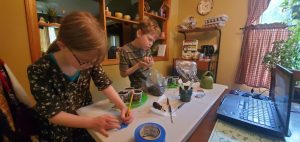 After an incredibly successful 4-H Summer Learning Series over the past two years, Maine 4-H will once again offer virtual experiential learning workshops and clubs to youth ages 5-18 from July 5 – August 5, 2022. Planning is still taking place, but topics in previous years have ranged from engineering, art, science, animals & agriculture, food & nutrition, teen leadership, and more.
After an incredibly successful 4-H Summer Learning Series over the past two years, Maine 4-H will once again offer virtual experiential learning workshops and clubs to youth ages 5-18 from July 5 – August 5, 2022. Planning is still taking place, but topics in previous years have ranged from engineering, art, science, animals & agriculture, food & nutrition, teen leadership, and more.
Early registration will be available to enrolled 4-H’ers on Friday, June 3, 2022 and will open to the public the following Monday, June 6. Help us spread the word to your friends and communities – enrollment in 4-H is not required to participate, this event is open to all! For more information, visit the 4-H Summer Learning Series webpage.
Summer Camp Opportunities
Visit the Summer University Youth Programs’ Youth Summer Camps page to learn about a huge variety of camp experiences available to youth. From our traditional 4-H Camp and Learning Centers, to camps that focus on Academics, Art, Music, or Sports – there is something for everyone.
The News in Homemakers
Spring Newsletter Published
Head on over to the Homemakers Newsletter page to check out the latest issue of the Maine Extension Homemakers Newsletter.
Help Us Collect Can Tabs

All Somerset County Homemakers Clubs are collecting can tabs to be recycled for cash that will be donated to the Ronald McDonald house. Anyone is welcome to contribute to the effort and can tabs can be donated by contacting any of the Extension Homemakers or by dropping them off at the Somerset County Extension office.
Volunteer in Somerset County!
Would you or someone you know like to become more engaged in volunteerism throughout Somerset County? Consider joining Homemakers! The Somerset County Extension Homemakers are always welcoming new members. Please visit the Maine Extension Homemakers website for general information about the program or reach out to the Somerset County Extension Homemakers President, Rita Fortin with any questions or to express interest. Rita can be reached at 207.453.2945 or at ritafortin2@gmail.com. You may also contact the Maine Extension Homemakers Coordinator, Lisa Fishman at 800.287.1421 or at lisa.fishman@maine.edu.
The News in the County
Alice’s Adventures: EFNEP Updates for the Month of May
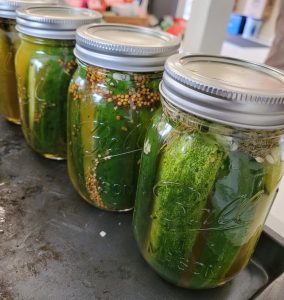 May marks the end of Alice’s after-school programming and the start of a 4-week nutrition series for youth at the Marti Steven’s Center in Skowhegan. This series focuses on science and math within healthy food choices and learning to cook new foods, such as the pickles that were made in the second class.
May marks the end of Alice’s after-school programming and the start of a 4-week nutrition series for youth at the Marti Steven’s Center in Skowhegan. This series focuses on science and math within healthy food choices and learning to cook new foods, such as the pickles that were made in the second class.
